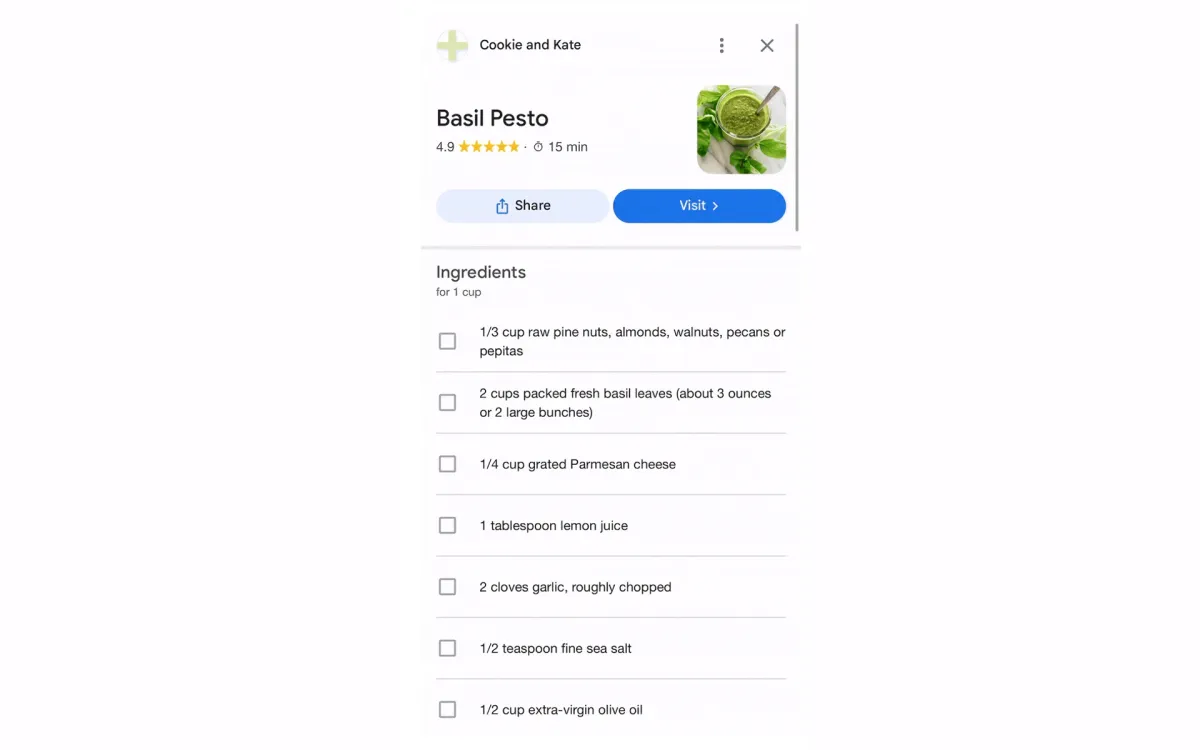
Google this month begun testing a new "Quick View" feature for recipes in its search results. This development, confirmed by Google Search Central on October 10, 2024, potentially alters how users interact with recipe content online and raises questions about the future of content discovery and monetization on the web.
The Quick View feature appears as a button overlaid on recipe images in Google Search results. When clicked, it displays a summary of the recipe content, including ingredients, instructions, and sometimes user comments, all within Google's interface. This new functionality keeps users on Google's platform rather than directing them to the original content creator's website.
Key details of the experiment
- Google describes this as an "early-stage experiment" being tested with a select number of creators.
- The company has established test agreements with participating content creators.
- The feature is currently limited in scope and not widely available.
Implications for publishers and users
Potential benefits for users
- Faster access to recipe information
- Streamlined user experience within Google Search
- Reduced need to navigate multiple websites
Concerns for publishers
- Traffic Reduction: The feature may significantly decrease visits to recipe websites.
- Revenue Impact: Fewer site visits could lead to reduced ad revenue for content creators.
- Content Ownership: Questions arise about how Google is using and displaying creators' content.
Industry reactions
The announcement has sparked discussions within the SEO and content creation communities:
- Barry Schwartz, a prominent search industry figure, expressed concerns about the feature leaving "little reason to click over to your site."
- Some content creators worry about the long-term implications for their businesses and the open web ecosystem.
- Questions have been raised about the terms of the test agreements and whether creators are being compensated.
Google's response
A Google spokesperson provided the following statement:
"We're always experimenting with different ways to connect our users with high-quality and helpful information. We have partnered with a limited number of creators to begin to explore new recipe experiences on Search that are both helpful for users and drive value to the web ecosystem. We don't have anything to announce right now."
Concerns over Google's publisher selection and market power
The introduction of the Quick View feature has raised additional concerns regarding Google's dominant position in the search market and its power to select which publishers participate in this experiment.
Google's Market Dominance
- As of 2024, Google holds approximately 91% of the global search engine market share.
- This dominant position gives Google significant influence over how online content is discovered and consumed.
Issues with selective publisher participation
- Gatekeeping: Google's selection of "a limited number of creators" for this experiment raises questions about fairness and accessibility.
- Potential for Bias: There are concerns that Google might favor larger, more established publishers, potentially disadvantaging smaller content creators or new entrants to the market.
- Lack of Transparency: The criteria for selecting participating publishers have not been made public, leading to speculation and uncertainty in the content creation community.
Antitrust implications
- Google's actions in this space could attract further scrutiny from antitrust regulators, who are already examining the company's practices in various jurisdictions.
- The ability to unilaterally implement features that significantly impact content discovery and monetization may be seen as an abuse of market power.
Impact on competition
- By keeping users within its ecosystem, Google could potentially reduce traffic to third-party websites, including competing recipe platforms or aggregators.
- This move might be seen as an attempt to consolidate Google's position as a primary destination for recipe content, rather than a gateway to other sites.
Publisher dependence
- Content creators may feel pressured to participate in such experiments to maintain visibility in search results, highlighting the power imbalance between Google and publishers.
- This dependence could potentially lead to unfavorable terms for content creators in the long run.
Industry perspectives on Google's role
Daniel Hart, Director & Editor in Chief at Ready Steady Cut, commented on the situation:
"This is now the future of the search monopoly. Only the luckiest will be selected based on agreements/deals. The future isn't freedom at Google. It's a control of who has a voice and who can prosper from online revenues."
Historical context
This is not Google's first attempt at a Quick View feature. A similar function was launched and subsequently removed about a decade ago. The reintroduction of this concept suggests Google's continued interest in enhancing user experience directly within search results.
Potential future developments
While currently limited to recipes, the Quick View feature could potentially expand to other types of content if deemed successful. This raises questions about:
- The future of web content discovery and consumption
- The evolving relationship between search engines and content creators
- Potential legal and ethical considerations surrounding content usage and attribution
Key Facts
- Announcement Date: October 10, 2024
- Current Status: Early-stage experiment
- Content Type: Currently limited to recipes
- Participating Creators: Select number, not publicly disclosed
- User Interface: Button overlaid on recipe images in search results
- Content Displayed: Recipe summary, ingredients, instructions, and possibly user comments

